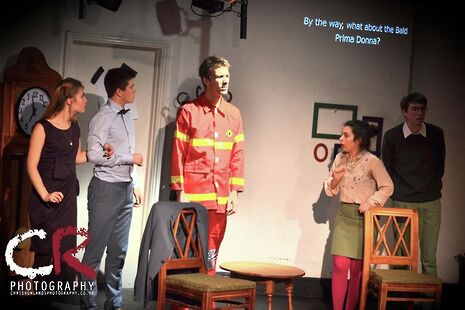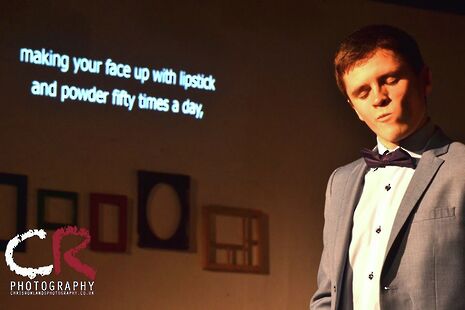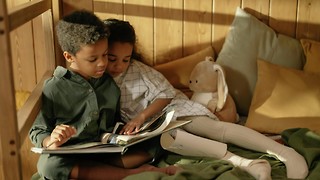The Bald Prima Donna
Camilla Seale loves this bold French production

The Bald Prima Donna, performed almost entirely in French, is unreservedly bold. It is all the subtext of dinner parties rooted out, upturned and slapped onto your auntie’s best tablecloth bum in the air. Performed vivaciously by a cast of six characters – two couples, a maid and a fireman – what starts out as a banal conversation between husband and wife is vamped up steadily into farce over the course of... an hour? Who knows – as the clock on stage appears to be going anti-clockwise.
Eugene Ionesco’s universe is ruled by chance and illogicality; a play that stands next to Beckett and Jean Genet in the theatre of the absurd. A critic of the original production from the London Observer suggested that Ionesco is cynical about language, as he constantly exploits misunderstanding and most of the time the characters don’t seem to hear each other at all. However, the sheer imaginative force of the play, from its structure to the details of exchange sequences, tell a different story.
It is not simply failure to communicate, but partial miscommunication that is at the heart of its comic value: things we believe to be true are reversed, taken literally or teleported into a new context. Mr Martin may or may not have noticed his wife flirting with the fireman when he says "It’s not going very well", but the audience are careered down a different path of half-remembered logic as his meaning is translated into a scene of the three men smoking outside comparing complaints of work and their wives.
Ionesco leads us to think moment by moment, as significance is created or demolished in seconds. The cast, some of whom are native French speakers (and much credit goes to those who are not), deal with the shifts from French to English and between a number of accents almost entirely without hesitation. Meanwhile, physical comedy adds another layer to the mix, complementing the dialogue with even more farce.

Directed by Maria Montague, both staging and pacing, in the intimate setting of the Corpus Playroom, are acrobatically handled. The space is constantly reinvented – two chairs for a dinner party become a psychoanalyst's couch. Mr Smith (Jake Spence) runs offstage to emerge seconds later through the audience in search of a fire. The fast pace is tempered by drawn out sections of silence as the two couples try to think of conversation starters, coming up with a series of non-sequiturs. Thoughtful and subtle characterization underlies the dialogue, from Andreea Tudose’s timid Mrs Martin, speaking volumes through facial expression, to Jess Peet’s potentially malign, tap dancing maid.
Moments such as when Mrs Smith (Louise Aryton), standing on a chair, proclaims "I don’t know enough Spanish to make myself understood" are some of the most entertaining, but simultaneously the most poignant, when we recall her husband’s constant habit of undermining her. When Mr Smith’s polite comment "you mustn’t interrupt, dear" is followed by an over-sexual "naughty girl" the audience are in fits. It is as though a trapdoor has been opened up underneath and a whole new vision of the couple’s relationship flashes past.
Mad, energetic and outrageous; this show provides an essential perspective on human relations. And in the spirit of cliché, it is safe here to say that it is side-splittingly, belly-achingly, rip-roaringly funny. Not only that, but you might just be persuaded that these characters make more sense than we do.
 News / Uni offers students £55k in payouts31 October 2025
News / Uni offers students £55k in payouts31 October 2025 News / Uni error forces deeper spending cuts31 October 2025
News / Uni error forces deeper spending cuts31 October 2025 News / College rowing captains narrowly vote to exclude trans women31 October 2025
News / College rowing captains narrowly vote to exclude trans women31 October 2025 News / Students allowed to use AI, says new uni guidance31 October 2025
News / Students allowed to use AI, says new uni guidance31 October 2025 News / Students launch women’s society excluding trans women31 October 2025
News / Students launch women’s society excluding trans women31 October 2025









